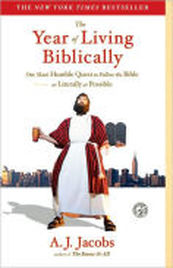 The Year of Living Biblically by A. J. Jacobs, original hardback published in 2007 by Simon & Schuster, now available in a number of formats and sources, all of which are listed on A. J. Jacobs’ website. You may also listen to Jacobs’ TED talk on the subject of his Biblical year and read an interview of Jacobs in Christianity Today.
The Year of Living Biblically by A. J. Jacobs, original hardback published in 2007 by Simon & Schuster, now available in a number of formats and sources, all of which are listed on A. J. Jacobs’ website. You may also listen to Jacobs’ TED talk on the subject of his Biblical year and read an interview of Jacobs in Christianity Today.
Well! If you look up all of the information I provide above you (almost) won’t need to read this post. But I hope you will, and then will go on and read the book. I had read it quite some time ago, probably around its publication, and had been struck with its essential sweetness, kindness and fairness.
For some reason I thought of it again recently and re-read it. No, the agnostic Jacobs did not convert to Christianity at the end of his year, but he became much more open to the truths of the Bible. And I think it’s always a good thing for Christians to be reminded of several principles:
1. We often gloss over the “difficult” parts of the Bible, even if we believe that “whatever the Bible says is so.” I am embarrassed to admit that it wasn’t until I was 25 years old and in a graduate English seminar at the University of Colorado when I realized that, to most people who read it, the story of Abraham’s being asked by God to sacrifice Isaac is extremely problematic. Was God really asking Abraham to kill Isaac? How was that not murder? How was it not human sacrifice? The teaching I had received was so focused on the symbolic aspects of the event (the “ram caught in the thicket” substitute for Isaac being a picture of Jesus, the Lamb of God), valid as they were, that I had never been forced to wrestle with the actual, literal meaning of the passage, even though I attended a church that prided itself on taking the Bible literally. There’s a lot to “unpack” in this story, as the popular term goes, and the teaching I received growing up only got through the first layer or two. I don’t claim to have any final answer here, by the way, although it is clear from the actual text that Abraham expects God to either raise or rescue Isaac: “He said to his servants, “Stay here with the donkey while I and the boy go over there. We will worship and then we will come back to you” (Gen. 22:5 NIV). Whatever happens, Abraham expects Isaac to come back with him. (And that idea was pointed out in my early teaching, to be fair.) The aspect of the story that seems to be the central point is Abraham’s faith in God, that He will fulfill His promises no matter what. Beyond that, good men have disagreed. The one thing the Bible believers must not do is to pretend that the difficulties don’t exist.
2. We don’t think nearly enough about whether or not our thoughts and deeds are pleasing to God. I have often said that I’m so thankful not to be an ancient Israelite, having to keep the ceremonial laws and bring a sacrifice every time I broke one. Jacobs comes away from his year of trying to do just that (minus the sacrifices) having become aware of how much even a rather humorous, short-lived attempt to live by God’s commandments changed him. He says in his TED talk, “I couldn’t believe how much my behavior changed my thoughts.” His words echo my recent C.S. Lewis quotation: “The distinction between pretending you are better than you are and beginning to be better in reality is finer than moral sleuth hounds conceive.” In other words, just because we know as Christians that we can’t change our natures by our own efforts, that principle doesn’t let us off the hook. The point is not to pursue a forced and dutiful obedience (“I’ll follow these commandments if it kills me!”) but a vibrant, loving relationship with God that changes us as we follow His commands.
3. We don’t engage very much with those who disagree with us. I heard a pastor say once that when someone is converted to Christianity as an adult, within an average of two years that person has no non-Christian friends. Family members, co-workers, neighbors: those will stay by necessity. But the people we choose to socialize with? Not so much. That’s tragic, and often happens because of our innate laziness and not out of a true desire for Christian fellowship. It’s just so much easier to interact with people who already agree with us! But if that’s all we do, we sink into lethargy and legalism.
Well, I can guarantee that, whatever your beliefs may be, you will find some surprising and touching insights in this book. You may groan at times at the sillier aspects of Jacobs’ quest, but you’ll be forced to think about how you view the Bible. Never a bad idea.
Very interesting, Debi, thank you!
Hebrews 11:9 tells us what Abraham was thinking. Since God is always faithful and had promised Abraham many descendants through his son Isaac, “He considered that God was able even to raise him from the dead, from which, figuratively speaking, he did receive him back. ”
Would that A.J. Jacobs would accept Jesus’ explanation of the law, “The Sabbath was made for man, not man for the Sabbath. So the Son of Man is lord even of the Sabbath.”